
General Assembly returns to Capitol Hill to begin work of 2020 legislative session
The 2020 legislative session of the 111th General Assembly is up and running. Lawmakers returned to Capitol Hill on January 14th, immediately getting to work on issues facing Tennessee this year. This includes opioid abuse and neonatal abstinence syndrome, funding for the Temporary Assistance to Needy Families (TANF) Program, implementation of REAL ID in Tennessee, and chronic disease prevention. The Senate also moved forward with two bills during the first week’s action and heard testimony from various departments and agencies of state government regarding issues of importance to Tennesseans.
Senate General Welfare Committee hears heart-rending testimony on opioid abuse and neonatal abstinence syndrome
The Senate Health and Welfare Committee heard extensive testimony from parents, nurses, doctors and state health and welfare officials regarding the short-term and long-term effects of opioid abuse and neonatal abstinence syndrome (NAS) on children in Tennessee. Several proposals are expected to be filed during the 2020 legislative session to address the problem.
Although the number of NAS cases in the state has decreased since 2017, 778 cases were reported in 2019. This is down from a high of 1,096 cases in 2017, making Tennessee the first state in the nation to report a decline. Tennessee Department of Health officials attribute this positive direction to a decrease in opioid prescribing, better access to and more effective treatment for substance exposure during pregnancy, additional family planning resources, and improvements in peripartum/postpartum care.
Neonatal Intensive Care Unit (NICU) nurse Cassie Arnold described the “cruel and unnecessary suffering” of critically ill NAS infants under her care due to mothers who abuse legal and illegal substances. She said, “We have all heard about the impact the opioid epidemic has on adults, however, we hear little of the cruel and unnecessary suffering that this can cause innocent children. Too many times, I have witnessed an innocent infant suffer the effects of withdrawal from a dependent substance that they never choose to take part in and watching this is something that is a heart-rending event that I will never forget.”
Some of the immediate symptoms of NAS include tremors, irritability, sleep problems, high-pitched crying, tight muscle tone, hyperactive reflexes, and seizures.
Foster parent advocate Renae Adelsberger testified about her experience as a foster and adoptive parent of children exposed to substance abuse. “The reality of drug exposure, early infant neglect, and repeated exposure to drugs has caused lasting damage,” said Adelsberger. “When many people think about an NAS diagnosis, they picture infants experiencing withdrawals. As the mother of three young children, I am here to tell you about the ongoing invisible damage.”
The General Assembly is looking at ways to better support non-academic needs of children born during the peak of Tennessee’s opioid crisis who are now entering kindergarten and need supports to be healthy and successful in school. The Tennessee Department of Education has asked for additional whole child supports to work towards ensuring every child’s basic needs are met and that they are ready to learn at their highest opportunity level.
Committee testimony also focused on the role that the state’s Safe Baby Courts play in helping to promote the healthy development of children exposed to opiate abuse. Safe Baby Courts provide rehabilitation services to families in crisis who enter the court system with children 36 months or younger. The courts aim to ensure secure and permanent placement for those children by focusing on rehabilitating parents who suffer from substance abuse disorders so they can be reunited with their children. The overall goal of the highly successful program is to put children’s long-term needs first. The General Assembly will consider proposals to extend the courts and the drug teams that work alongside them. Legislators are also looking at expanding evidence-based home visiting programs, prevention resources, substance abuse and mental health treatment availability, and postpartum coverage for mothers.
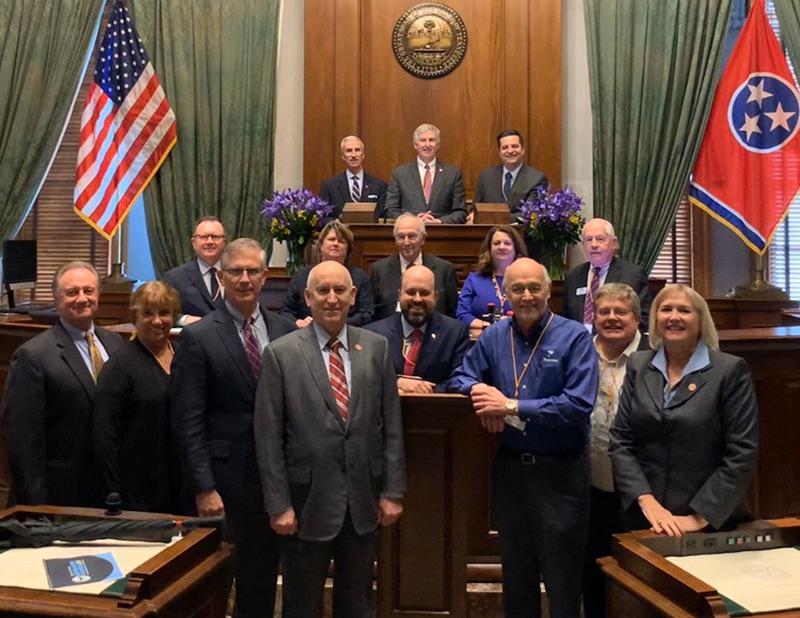
Senator Briggs and I enjoyed welcoming representative of the Knoxville Chamber
General Assembly’s TANF Working Group meets to set priorities
The General Assembly joint working group appointed to study possible changes to the state’s Temporary Assistance to Needy Families Program (TANF) heard testimony from Commissioner Danielle Barnes and other key officials as they work to set priorities for unspent funds for the program. The state has approximately $732 million in unspent funds from the federal block grant program which supports Tennessee’s Families First program. Families First provides important support to struggling families such as child care assistance, temporary cash assistance, transportation, job training, employment activities and other support services.
The study group is looking at innovative new ways to assist those served by the program, while responsibly maintaining funds needed for any future downturn in the economy. Proposed funding projects will likely be focused on housing, family and stabilization, educational and child care support for children, drug addiction, and workforce development.
Governor Bill Lee has also announced plans for investing the surplus funds. The working group will be diving deeper into the details of his administration’s plans for the funds over the next few weeks as they list their priorities. Recommendations are expected to be completed by the February 6 deadline for filing bills for the 2020 legislative session.
The TANF program is designed to accomplish four goals: to provide assistance to needy families so that children may be cared for in their own homes or in the homes of relatives; to end the dependency of needy parents on government benefits by promoting job preparation, work, and marriage; to prevent and reduce the incidence of out-of-wedlock pregnancies and establish annual numerical goals for preventing and reducing the incidence of these pregnancies; and to encourage the formation and maintenance of two-parent families. States have broad flexibility to carry out their TANF programs utilizing these goals.
Transportation and Safety Committee Briefed on Implementation of the Federal REAL ID Act
The Tennessee Department of Safety briefed members of the Senate Transportation and Safety Committee, which I chair) on the current process to obtain a Tennessee driver’s license compliant with the federal REAL ID Act. The Tennessee Department of Safety began issuing REAL ID licenses on July 1, and updated committee members on several measures taken to shorten the increasing wait times at driver services centers as a result of the REAL ID.
The REAL ID licenses are voluntary in Tennessee but are in high demand. Starting October 1, 2020, a REAL ID, passport, or other acceptable form of federal identification will be required to board a plane and enter certain federal buildings. REAL IDs have increased security features making them more difficult to counterfeit.
The influx of Tennesseans heading to the centers are causing heavy traffic and longer wait times, a problem which has concerned many lawmakers. According to Assistant Commissioner of Driver Services Paula Shaw, the average wait time across Tennessee is 1 hour, 7 minutes from the time an individual makes it through the driver services center’s door and receives a ticket. Shaw said 11 of the state’s 47 driver services centers are handling 40 percent of driver services throughout the state as a main cause of increasing wait times.
Key measures taken by the Department of Safety to improve driver services centers includes hiring 30 new part-time employees, with 55 additional temporary positions approved for high volume centers, mostly located in metropolitan areas. The new staff will help reduce long lines and ensure people have the right documents before waiting up to an hour or more in line. Additionally, many county clerk offices across the state have partnered with the Department of Safety to offer REAL IDs, including Knox County.
The Department of Safety is also looking at new technology such as scheduling opportunities and text updates, which could be implemented as early as next month.
A REAL ID license is indicated by a star surrounded by a gold circle, whereas, Tennesseans who choose not to upgrade to REAL ID are issued a license printed with “not for federal identification” at the top.
The following documents, which are currently required to obtain a standard Tennessee license, must be presented when applying for a REAL ID:
Proof to establish citizenship or legal presence (birth certificate, passport, etc.)
Proof of your full Social Security Number (card, W-2 form, tax return, 1099)
Two proofs of Tennessee residency (utility bill, rental agreement, bank statement, vehicle registration, etc.)
Click here for the complete list.
It costs Tennesseans a normal renewal fee of $28 to obtain a REAL ID license or only $8 for a duplicate REAL ID license. For more information on Tennessee’s REAL ID visit here.
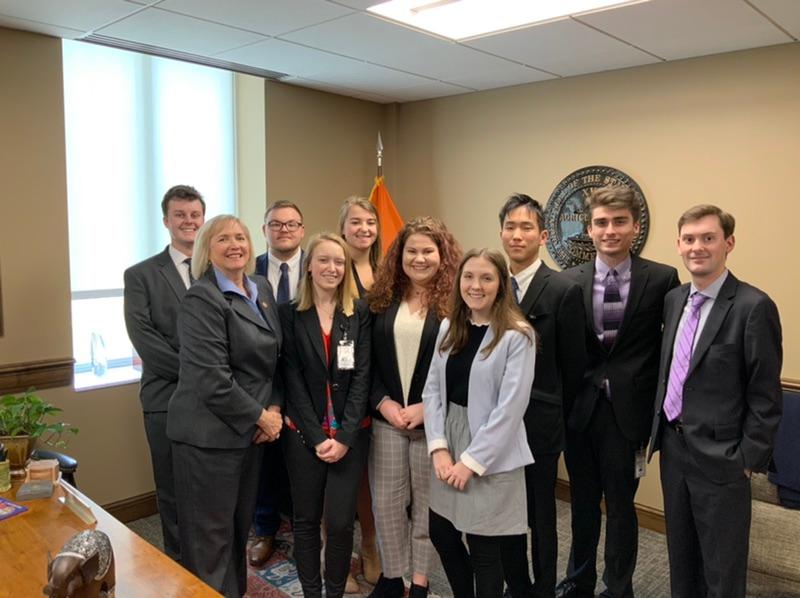
I was pleased to welcome this years class of interns from UT Knoxville. These young women and men will be an integral part of the offices of the Knox County delegation
In Brief…
Public servants remembered – One of the first orders of business during the opening day of the 2020 legislative session was recognition of the public service of former State Senator Sue Atchley (R-Knoxville) and Reginald Tate (D-Memphis), former Representative Sterling Haskel “Hack” Ayers, General Assembly staffer Glenn Barber, and Master Patrol Officer Spencer Bristol, who passed since the legislature adjourned last August. Bristol, age 31, died in the line of duty in December after being struck on Interstate 65 by a vehicle during a foot pursuit of a suspect, leaving behind a wife and three-year old daughter. Nine Tennessee law enforcement officers were killed in the line of duty in 2019, including Tennessee Department of Correction Administrator Debra Johnson, while there were 134 deaths nationwide.
Department of Labor and Workforce touts job center success — Tennessee Department of Labor and Workforce Development Commissioner Jeff McCord announced a ‘big win’ for his department before the Senate Labor and Commerce Committee on Tuesday. McCord’s department has partnered with the American Job Center to not only aid Tennesseans in finding employment, but having the center provide quality jobs to residents in a region that needs it most. McCord says that many of those who visit the American Job Center have computer literacy issues. He touts great success with the creation of positions at the Hawkins County center to help those struggling to use the technology the center provides. McCord says the creation of these positions gives residents the opportunity to have a higher quality job in their region than they would have in Nashville. The department hopes to first create these positions in nine regions, with the ultimate goal to have these resources at all 20 locations across the state.
Joint Taskforce discusses ways to create a healthier Tennessee — The General Assembly’s Joint Chronic Disease Prevention Taskforce heard from Department of Health and Department of Education officials during their first meeting of 2020. The task force was created last year by the General Assembly in efforts to lower the current rates of largely preventable diseases such as diabetes, high blood pressure, and cardiovascular disease in Tennessee. Currently, Tennessee is ranked 9th highest in diabetes, 7th highest in hypotension, and 10th highest in cardiovascular disease.
Highlights of the meeting included testimony from Executive Director of Coordinated School Health Laurie Paisley who talked about how her team is partnering with public schools and parents to fight childhood obesity. Department of Health Director of the office of Primary Prevention Leslie Meehan spoke about Built Environment Grants, a program to increase access to safe and publicly-accessible places that provide opportunities for physical activity. Deputy Commissioner for Population Health, Dr. Morgan McDonald informed the group that tobacco is the number one killer of Tennessee residents and that more needs to be done to prevent use.
The group will continue their work in the coming weeks as they seek to address some of the most state’s most serious preventable health conditions.

This year’s version of the Tennessee Blue Book honors the 100th anniversary of the state’s ratification of the 19th Amendment granting women the right to vote and the pivotal role Tennessee played. We became the 36th (and final) state needed to ratify the amendment. The book’s cover is yellow-the color of the women’s suffrage movement. It’s the first time the bianniel volume has appeared in a non-blue cover since the 2013-2014 edition, which was orange to honor Lady Vols basketball coach Pat Summit. Blue Books had white overs for much of the 1960s and early 1970s. They changed to the familiar blue covers in 1975.
Published every two years, the Tennessee Blue Book is the definitive manual on Tennessee state government. It features detailed information about all three branches of government, our state history, biographies of elected and appointed state officials, census data, election statistics, and more.
If you would like your complimentary copy, please click here.
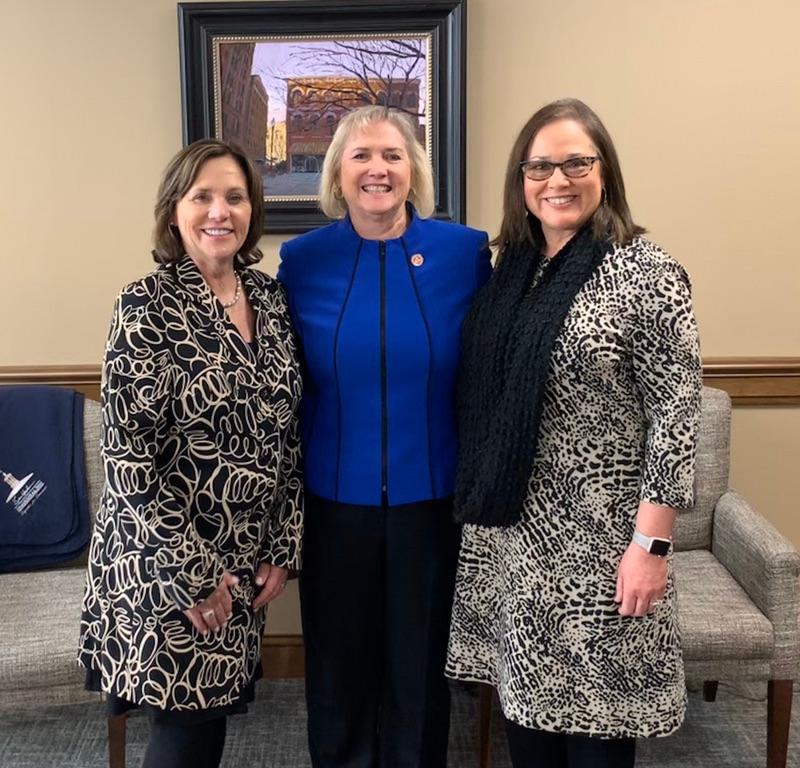
I enjoyed my visit with Elaine Streno and Rhonda Chafin with Second Harvest Food Bank
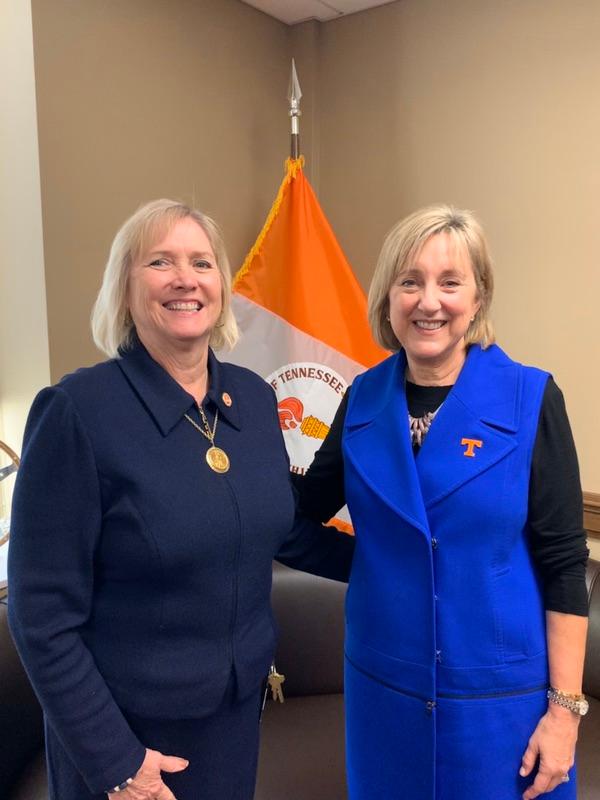
UT Knoxville Chancellor Donde Plowman stopped by my office for a visit
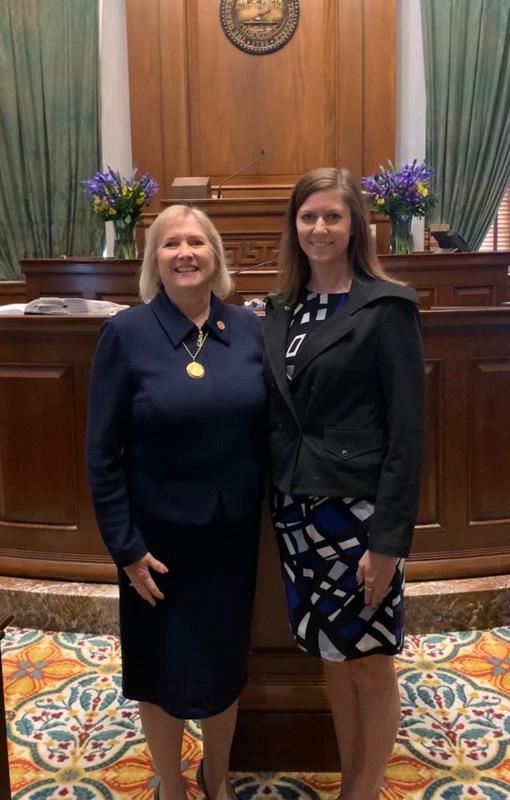
Also a treat to have my daughter, Courtney visit me during legislative session

A big day with the announcement of the partnership of the UT System, Volkswagen and Oak Ridge National Lab to research lighweight car components and develop electric vehicles.
For information on State Senators including phone numbers and email addresses, click Tennessee State Senators.
For House members, click Tennessee House Members
For all other information on the General Assembly including legislation, schedules and videos, click Tennessee General Assembly
As always thank you for continued support!
Sincerely,
Becky Massey
District 6 Senator
615-741-1648.
